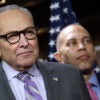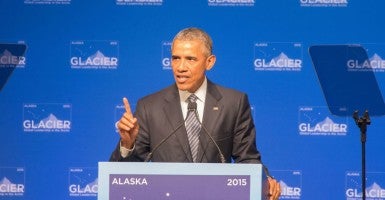President Obama gave a doom and gloom speech yesterday at the Global Leadership in the Arctic (GLACIER) conference in Alaska to build momentum for the U.N. climate deal in Paris this December.
So far less than one third of countries have submitted plans to cut carbon dioxide emissions by the Wall Street Journal’s count.
According to Obama, “Climate change is happening faster than we’re acting” and the world is facing a future of more fires, more melting, more warming, more suffering.
But there are at least two major problems with his focus on global warming as he’s presented it in Alaska.
- Ignoring Evidence On Climate Change
Obama continues to ignore science that doesn’t fit his narrative and has ignored sound evidence from people who disagree with him. Many of the environmental trends Obama has warned of do not appear to fit current realities.
In his speech he warned that,
“If [current] trend lines continue the way they are, there’s not going to be a nation on this earth that’s not going to be impacted negatively…More drought, more floods, rising sea levels, greater migration, more refugees, more scarcity, more conflict.”
However, Judith Curry, professor at Georgia Institute for Technology and participant in the International Panel on Climate Change and National Academy of Sciences, writes that when politicians talk about an undeniable climate “consensus” they are brushing over “very substantial disagreement about climate change that arises from:
- Insufficient observational evidence
- Disagreement about the value of different classes of evidence (e.g. models)
- Disagreement about the appropriate logical framework for linking and assessing the evidence
- Assessments of areas of ambiguity and ignorance
- Belief polarization as a result of politicization of the science
All this leaves multiple ways to interpret and reason about the available evidence.”
Curry, and others with evidence countering the president’s narrative of an accelerating and catastrophic warming, are labeled by Obama as “critics,” “cynics,” “deniers,” and on “their own shrinking island.”
Yet data of observed reality collected from the U.N.’s International Panel on Climate Change and the U.S. National Climate Data Center does not show increasing frequency of extreme weather across the globe, whether you look at hurricanes, tornadoes, droughts, or floods.
With so much yet unknown or unclear, one has to wonder if we are entirely misdiagnosing the problem.
- What Will New Measures Do?
Obama hasn’t given Americans, or the world, an answer to perhaps the most important question: what kind of impact will global warming measures accomplish?
For starters, Federal subsidies and tax credits for wind and solar have cost billions of dollars while only increasing wind and solar contribution to the American energy by only 5 percent. In addition, it has tied both industries to government dependence with only minor success.
Energy efficiency mandates have reduced choices for Americans through the back door of regulation.
That has meant more expensive kitchen appliances or car models that must prioritize carbon dioxide emissions over other preferences like size, safety, or performance, not to mention an insult to the ability of Americans to make good energy efficiency choices for themselves.
And the Clean Power Plan, should it survive the serious legal problems with the regulations, promises to create a $2.5 trillion loss in GDP, hundreds of thousands of jobs lost, and a total income loss of $7,000 per person by 2030.
Those hardest hit will be people in manufacturing and with lower incomes.
Rich with irony, Obama warned that if we don’t act on climate change there would be “entire industries of people who can’t practice their livelihood.”
Tell that to those in the coal industry facing the gauntlet of the Clean Power Plan and a slew of other federal regulations, or miners and oil companies in Alaska in the crosshairs of the Obama administration’s zero carbon economy.
As it turns out, these mandates and subsidies also prove to be barriers to the progress and innovation the Obama administration wants.
Where does it get us on the path to addressing global warming?
Just shy of nowhere, or less than 0.002 degrees Celsius using an EPA model.
Jim Hansen, far from Obama’s global warming “deniers,” called the Clean Power Plan “practically worthless,” even though it is the centerpiece of the Obama administration’s climate agenda.
The administrator of the Environmental Protection Agency, responsible for the Clean Power Plan, has testified before Congress that the Clean Power Plan isn’t about reducing global temperatures but “an investment opportunity” and “the tone and tenor” of international climate discussions.
Too many government policies, at home and abroad, make opportunity further out of reach under the misguided notion of making a dent in global warming.
In the process they thwart the opportunity, mobility, and wealth that can empower people to deal with environmental challenges.



























One Reply to “Obama Is Ignoring the Science on Climate Change”